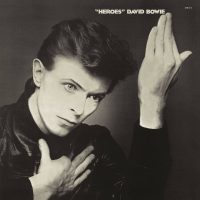 Written by: David Bowie, Brian Eno
Written by: David Bowie, Brian Eno
Recorded: July-August 1977
Producers: David Bowie, Tony Visconti
Released: 14 October 1977
Available on:
“Heroes”
All Saints
Personnel
Contents
Brian Eno: synthesizer
‘Neuköln’ is an instrumental piece on David Bowie’s 1977 album “Heroes”.
It was inspired by the Neukölln district of Berlin – Bowie misspelt the name. Although gentrified in the 21st century, Neukölln was historically one of the poorer parts of the city, and characterised by having a high percentage of immigrants.
Berlin is a city made up of bars for sad disillusioned people to get drunk in. One never knows how long it is going to remain there. One fancies that it is going very fast. That’s one of the reasons, sure, why I was attracted to the city. It’s a feeling that I really tried to capture in the paintings, while I was there, of the Turks that live in the city. There’s a track on the album called ‘Neuköln’, and that’s the area of Berlin where the Turks are shackled in bad conditions.They’re very much an isolated community. It’s very sad. Very very sad. And that kind of reality obviously contributed to the mood on both Low and “Heroes”.
I mean, having encountered an experience like that it’s hard to sing ‘Let’s all think of peace and love…’ Because that’s exactly where you should arrive after seeing something like that. You arrive at a sense of compassion.
Melody Maker, 29 October 1977
The track appeared on both the 1993 and 2001 versions of Bowie’s instrumentals compilation All Saints.
In the studio
‘Neuköln’ was one of four tracks co-written with Brian Eno – the others were “Heroes”, ‘Moss Garden’, and ‘The Secret Life Of Arabia’.
We stayed late one evening and did that piece called ‘Neuköln’. I liked that very, very much. I was very impressed by that.And I was trying to think what it was like in painting. There was a German school in Berlin at the beginning of the century called Die Brucke (The Bridge) – an expressionist school. Very rough, tough strokes – and they all have a mood of melancholy about them or nostalgia, as if they were painting something that was just disappearing.
And all of that – the boldness of attack, the unplanned evolutionary quality of the images, and the over-all mood – remind me of the way David works.
NME, 3 December 1977
Bowie played free-flowing and occasionally discordant alto saxophone on the recording – an approximation, he said, of Turkish music. Producer Tony Visconti described it as “saxophone with tortured angst”.
I’ll give you some background. Neukölln is an area of Berlin which is primarily Turkish and I had to work out a way of putting a Turkish modal thing into it. It was very hard for me to use that scale against the background, so that probably produced the humorous aspect… whole notes where one would take a half note, it goes into whole notes on the Turkish scale. So it was really difficult to keep it going. Yeah (laughs). There’s kind of a lot of Ornette Coleman at the end of it.

NEUKoLLN has become a more popular place to visit in Berlin if you want to see the real Germany!